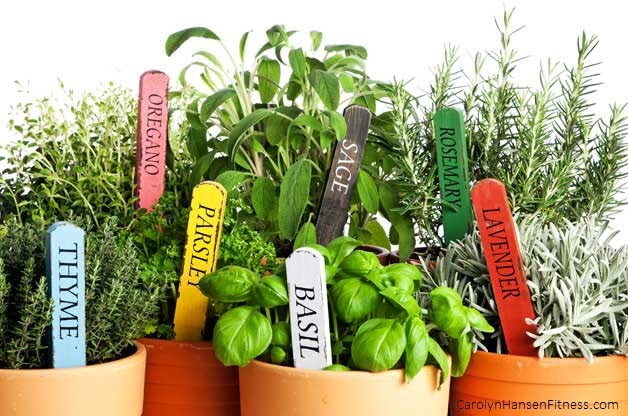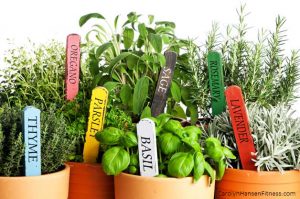Some of the best nutrients that nature provides us comes packaged up in small containers. Herbs are some of those things.
Offering a fresh from Mother Earth taste to your recipes, herbs are some of the healthiest foods you can eat. Adding character, spice, appeal and health benefits to every dish they are invited to, many of them make the transition from savory to sweet dishes easily with their delicate flavors and aromas.
According to Brian Hetrich, a gardening expert and naturopathic doctor at the Hippocrates Healthy Institute “half the nutritional value of plants are lost within thirty minutes of harvesting.” This means that no matter how healthy and appealing they look at the market, they have already lost a great deal of nutrients that nature freely provided.
Not so with a fresh herb home garden…
The great thing about most herbs is that they can easily be grown right at home…in a garden or planter. (although they can grow easily in planters, herbs love to spread out too so don’t be afraid to give them room in your garden). This allows us to pick them right as we’re ready to use them taking advantage of all their nutrients and health benefits.
Planting indoors is easy:
Planting tray of some sort
Organic potting mix
Seeds or starter plants easily obtained at any nursery or garden center for a nominal price.
Here’s 8 of the top and most popular kitchen herbs that are easily grown in any garden:
Rosemary: Pretty and aromatic, the scent of this herb has been shown to improve memory. It has also been shown to fight cancer cells with its carnosic acid compounds. Frequent watering in full sun. Simply touching it will releasing its unique scent.
Thyme: As long as it gets plenty of sunshine, this herb grows well in indoor gardens because its stays relatively small in size. Long known for its antiseptic properties and its success as a remedy for respiratory problems, it is calorie free so you can add it freely to any soup, salad or side dish.
Parsley: Common yes. Often overlooked and shoved aside, yes. Parsley is nutrient rich with more than ½ the daily recommended intake of vitamin K contained in just one tablespoon. It also offers vitamins A and C. Not much sunshine is required for them to thrive but make sure to keep the soil from getting too dry. It’s hard to renew wilted parsley.’
Cilantro: This popular staple of both Asian and Mexican cuisines is a great source of fiber and supplies a hefty dose of iron. It helps clear heavy metals from our body by attaching itself to them and drawing them out of the tissues. The seeds of cilantro are the spice known as coriander. Cilantro is a little more challenging to grow in a home garden because it requires deep soil in order to thrive. You can sow the seeds outdoors in the spring and summer and will continue to regrow from seed that drop from harvested plants throughout the growing season. Grown in full sun or light shade.
Basil: This popular herb offers a warm and spicy flavor to any dish. It offers a wealth of vitamins including A, K and C as well as magnesium, potassium, iron and calcium. Grown in a sunny locations the seeds can be sown directly into the garden in late spring or started from seed indoors in early spring and transplanted into your garden later on. Basil’s rich minty aroma is a nice addition to any peach dish. Make sure you keep pinching off the flower heads so that the plant will keep throwing out new leaves all season.
Dill: This flavorful aromatic herb offers a healthy dose of antioxidants such as beta-carotene. Requiring full sun, this easy to grow herb needs a garden or large post to grow in and soil that is deep but not too dense.
Lavender: Lavender is often used as a seasoning for baking. Its distilled oils have been useful and versatile as herbal remedies. Grown by seed indoors and then transplanted outdoors in full sun in early spring, lavender does not tolerate excessive moisture or humidity.
Peppermint: This aromatic and tasty herb has talents beyond the kitchen. It is an excellent deterrent for many pests such as rodents, ants and spiders so plant it around your home and garden. Peppermint leaves are a refreshing healthy addition to many beverages and desserts. Grown indoors than transplanted outside they can also be grown directly outdoors. Full sun or partial shade is best.
Most veggies and many herbs can be used with great success in desserts and treats and can be key to getting the required daily requirements of nutrients that your body needs.
It’s time to step out of your comfort zone, expand beyond your traditional recipes and upgrade them to a more nutritional level – “Blended Bites will help you do just that.



